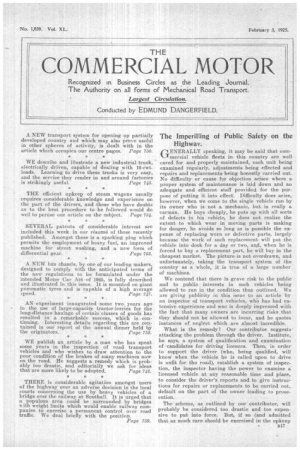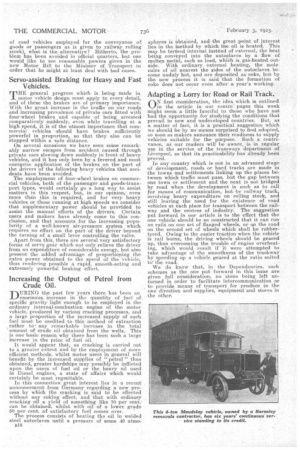The Imperilling of Public Safety on the Highway.
Page 1

Page 2

If you've noticed an error in this article please click here to report it so we can fix it.
CIENERALLY speaking, it may be said that com mercial vehicle fleets in this country are well eared for and properly maintained, each unit being examined regularly, adjustments being effected and repairs and replacements being honestly carried out. No difficulty or cause for objection arises where a proper system of maintenance is laid down and an adeqnate and efficient staff provided for the purpose of putting it into effect. Difficulty does arise, however, when we come to the single vehicle run by its owner who is not a mechanic, but is really o. carman. He buys cheaply, he puts up with all sorts of defects in his vehicle, he does not realize the extent to which wear in moving parts is making for danger, he avoids so long as is possible the expense of replacing worn or defective parts, largely because the work of such replacement will put the vehicle into dock for a day or two, and, when he is forced to buy a replacement part, he will buy in the cheapest market. The picture is not overdrawn, and unfortunately, taking the transport system of the country as a whole, it is true of a large number of machines.
We contend that there is grave risk to the public and to public interests in such vehicles being allowed to run in the condition thus outlined. We are giving publicity in this issue to an article by an inspector of transport vehicles, who has had extensive experience and wno is deeply impressed with the fact that many owners are incurring risks that they should not be allowed to incur, and he quotes instances of neglect which are almost incredible.
What is the remedy? Our contributor suggests attacking the problem through the driver. Institute, he says, a system of qualification and examination of candidates for driving licences. Then, in order to support the driver (who, being qualified, will know when the vehicle he is called upon to drive is unfit for the road), establish a system of inspection, the inspector having the power to examine a licensed vehicle at any reasonable time and place, to consider the driver's reports and to give instructions for repairs or replacements to be carried out, default on the part of the owner leading to prosecution.
The scheme, as outlined by our contributor, will probably be considered too drastic and too expensive to put into force. But, if so (and admitted that, as much care should be exercised in the upkeep of road vehicles employed for the conveyance of goods or passengers as is given to railway rolling stock) what is the alternatiye I Hitherto, the problem has been avoided in official quarters, but one would like to see reasonable powers given in the new Motor Bill to the Minister of 'transport in order that he might at least deal with bad cases.
Servo-assisted Braking for Heavy and Fast Vehicles.
T"general progress which is being made in motor vehicle design must apply to every detail, and of these the brakes are of primary importance. With the great increase in the traffic on our roads and increasing prevalence of private cars fitted with four-wheel brakes and capable of being arrested comparatively suddenly, even while travelling at a high speed, it is of the utmost importance that coinmerciat vehicles ,should have brakes sufficiently powerful in proportion, so that they also can be stopped within a safe distance.
On several occasions we have seen some remarkably narrow escapes from accident caused through private cars slowing down suddenly in front of heavy vehicles, and it has only been by a fevered and most energetic application of the brakes on the part of the drivers of the following heavy vehicles that accidents have been avoided.
The employment of four-wheel brakes on commercial vehicles, both of the passenger and goods-transport types, would certainly go a Jong way to assist matters in this respect, but, in our opinion, even more than this is required, and for very heavy vehicles or those running at high speeds we consider that supplementary power should be provided to assist the manual efforts of the drivers. Certain users and makers have already come to this conclusion, and that accounts for the increasing popularity of a well-known air-pressure system which requires no effort on the part of the driver beyond the turning of a small lever controlling the valve.
Apart from this, there are several very satisfactory forms of servo gear which not only relieve the driver from an expenditure of considerable energy, but also present the added advantage of proportioning the extra power obtained to the speed of the 'vehicle, thus rendering possible a rapid, smooth-acting and extremely .powerful braking effort.
Increasing the Output of Petrol from Crude Oil.
DURING the past few years there has been an enorinous increase in the quantity of fuel of specific gravity light enough to be eraployed in the ordinary internal-combustion engine of the motor vehicle, produced by various cracking processes, and a large proportion of the increased supply of such fuel must be credited to this method of extraction rather to' any remarkable increase in the total amount of crude oil obtained from the wells. This is one basic reason why there has been such a large increase in the price of fuel oil.
It would appear that, as cracking is carried out to a greater extent and by the employment of more effieient methods, whilst motor users in general will benefit by the increased supplies of " petrol " thus obtained, greater hardships may possibly be inflicted. upon the users of fuel oil or the heavy oil used in Diesel engines, a state of affairs which would certainly be most regrettable.
In this connection great interest lies in a recent announcement from Germanyregarding a new process by which the cracking is said to be effected without any coking effect, and that with ordinary cracking oil a yield of something like 70 per cent. can be obtained, whilst with oil of a lower grade 50 per cent. of satisfaCtory fuel comes over.
The process consists of heating the oil in weldedsteel autoclaves until a pressure of some 40 atmoale spheres is btainecl, and the great point of interest lies in the nethod by which the oil is heated. This may be ter led internal instead of external, the heat being cony yed into the autoclaves by a flow of molten met I, such as lead, which is,gas-heated outside. ' Wit ordinary external heating, the molecules of oil nearest the sides of the autoclaves become unduly hot, and are deposited as coke, but by the new process it is said that the formation of coke does not occur even after a year's working.
Adapting a Lorry for Road or Rail Track.
ON first consideration, the idea which in outlined in the article in our centre pages this week might seem a little fanciful to those who have not had the opportunity for studying the conditions that prevail in new and undeveloped countries. But, as a matter of fact, it is a practical suggestion which we should be by no means surprised to find, adopted, so soon as makers announce their readiness to supply vehicles suitable for the purpose. Such a. contrivance, as our readers will be aware, is in regular use in the service of the tramways department of Liverpool, so that its practicability has already been proved.
In any country which is not in an advanced stage of development, roads or hard tracks are made in the towns and settlements linking up the places between which traffic must pass, but the gap between one town or settlement and the next is not bridged by road when the development is such as to call for means of communication, but by railway track, involving heavy expenditure on rolling stock, and still leaving the need for the existence of road vehicles at each place for transport between the railway and the centres of industry. The suggestion put forward in our article is to the effect that the one vehicle should be so constructed that it can run on rails on one set of flanged wheels, or on the road on the second set of wheels which shall be rubbertyre& Owing to the easier traction when the vehicle is rail borne, the driving wheels should be geared up, thus overcoming the trouble of engine overheating, which would result if it were attempted to take advantage of the smoothness of the trackway by speeding up a vehicle geared at the ratio suited to' the road.
We do know that, in the Dependencies, such schemes as the one put forward in this issue are given full consideration, no stone being left unturned in order to facilitate intercommunication or to provide means of transport for produce in the one direction and supplies, equipment and stores in the other.




























